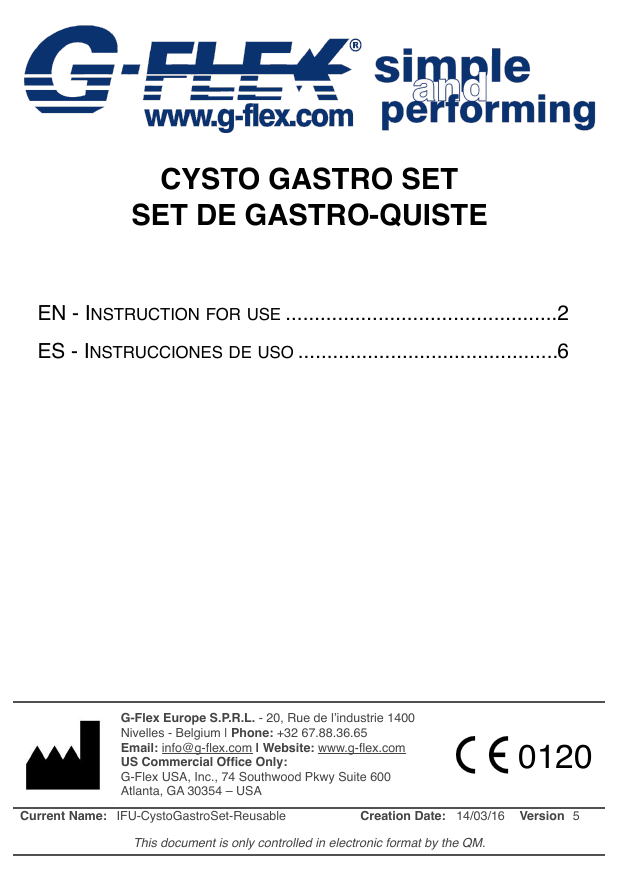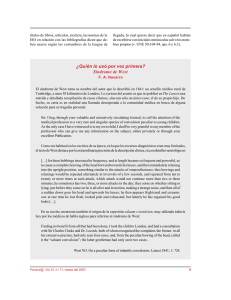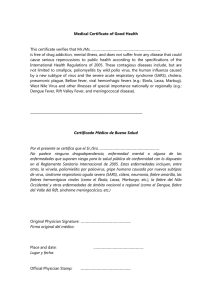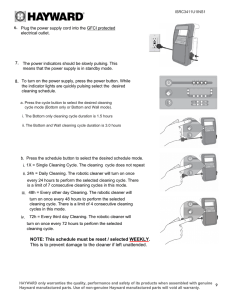cysto gastro set set de gastro-quiste - G-Flex
Anuncio

CYSTO GASTRO SET SET DE GASTRO-QUISTE EN - INSTRUCTION FOR USE ...............................................2 ES - INSTRUCCIONES DE USO .............................................6 G-Flex Europe S.P.R.L. - 20, Rue de l’industrie 1400 Nivelles - Belgium | Phone: +32 67.88.36.65 Email: info@g-flex.com | Website: www.g-flex.com US Commercial Office Only: G-Flex USA, Inc., 74 Southwood Pkwy Suite 600 Atlanta, GA 30354 – USA Current Name: IFU-CystoGastroSet-Reusable Creation Date: 14/03/16 This document is only controlled in electronic format by the QM. 0120 Version 5 : EN - INSTRUCTION FOR USE Intended Use Cysto-Gastro-Sets are intended to be used to puncture pancreatic cysts or pseudocysts endoscopically as an alternative to surgical or percutaneous treatments. During the procedure the cyst is punctured by a electrical high frequency needle and dilated to a diameter of 6, 8.5 or 10 Fr. ( depending on which set is used ). Product Description The device is made of an outer flexible teflon tube equipped with a metal tip at the distal end and an HF connector and the proximal end (all models). There is an inner catheter with a puncture needle at the distal end and both a Luer-lock and an HF connector and the proximal end (except on the 6Fr set ). Advices before first application Please read carefully and follow all safety operating instructions and warnings before first application of the device. A previous knowledge regarding handling and operation is required and essential. Unpack the instrument carefully and examine the devices for any possibility of damage. In case of any damage or missing items contact your distributor immediately. Considering that device are not delivered sterilized the user must do it before the first application (See Cleaning and Sterilization) If the package present any damaged, the sterility of the device is not guarantee. Handling and Operation Ensure that both components are assembled and fixed at the Luer-Lock connection. Please note: The inner catheter is approx. 20 cm longer than the outer Teflon tube. Both parts of the device are supplied with HF connectors that need to be fixed to and appropriate active cords. Cysto-Gastro-Sets require a endoscope´s working channel of at least 3.7 mm Ø for 10Fr Set, 3.2 mm Ø for the 8.5 Fr Set or 2.8 mm for the 6 Fr. Use cut frequency only since the use or excess of coagulation frequency can damage the product. Recommended frequency is between 80 and 120watts. Procedure After the size and position of the cyst or pseudo-cyst is determined by endosonography, the device is inserted into the endoscope´s operating channel. • Connect the active cord to the HF connector at the proximal end of the inner catheter and into the HF generator. 2 • Carefully move out the puncture needle of the inner catheter (on 8.5 or 10 Fr sets only). • Puncture the stomach or duodenal wall and the cyst with the puncture needle by using electric current (For the 6 Fr set use directly the outer tube as there is no inner catheter). • Disconnect the electric current and remove the active cord from the inner catheter. • If necessary, contrast can be injected through the lateral Luer-Lock adapter at the proximal end of the inner catheter (on 8.5 or 10 Fr sets only). • Now connect the active cord to the lateral connector at the outer tube and to the HF generator. • Loosen the Luer-Lock fixation between inner catheter and outer tube. Push forward the outer tube by using the inner catheter as a guiding catheter until the distal metal tip reaches the stomach wall. • Switch on electricity and dilate the stomach’s and cyst’s opening in the wall by pushing forward the outer tube’s metal tip carefully. • Remove the active cord and leave the outer tube at its position. • Terminate the HF -connection and withdraw the inner catheter completely (out of the outer tube and the endoscope). • Place a guide wire ( .025“” or .035””) through the outer tube into the cyst. • Finally, remove the outer tube out of the working channel, while ensuring that the guide wire stays in position. • Use the guide wire to place a Pigtail or Double Pigtail stent in order to drain the cyst, after the cystostomy. Storage This device is delivered sterilized and in order to maintain this state until its first use it must be kept in its original sterilized package. Do not put any objects on the instrument or its package! Do not store the instruments near aggressive chemical products! Do not expose the instruments to direct or indirect sunlight or other ultra-violet rays! Keep in dry area Complaints will not be taken under consideration if the instruments have been stored improperly. Cleaning and Sterilization G-Flex recommend to follow one of the following sequences when sterilizing the device: • Manual Cleaning, Ultrasonic Cleaning, Automatic/Thermal Cleaning and Autoclave; or • Manual Cleaning, Ultrasonic Cleaning, Automatic/Thermal Cleaning and Ethylene Oxide Gas Sterilization 3 Either sterilize by Autoclave or by ETO. There is no need to do both. Manual Cleaning The cleaning of the device should be done immediately after each use: • Immerse the device in a suitable liquid detergent or disinfectant (Always observe the minimum diameter of 20 cm when winding the instrument and applicability of the cleaning product!). • Wipe the instrument with a soft towel. Ultrasonic Cleaning The ultrasonic cleaning facilitates the dislodging of residual material and must be done before sterilization. The ultrasonic cleaning must last for at least 30 minutes. • Clean the device right after its use. • Put the instrument in an ultrasonic cleaning tank always observing the winding minimum diameter 20 cm (Please observe the ultrasonic equipment manufacturer’s instructions!). • Use only tap water and the detergents which dissolve albumen, always according to ultrasonic equipment manufacturer’s instructions. • Rinse the instrument with tap water and wipe dry by using gauze pads. Automatic / Thermal Cleaning Alternatively or additionally to the manual cleaning, this instrument may also be cleaned in automatic / thermal cleaning machines by using approved alkaline detergents. Please refer to relevant instructions of the cleaning machine supplier. Sterilization - Autoclave Before autoclaving sterilization the instrument should be cleaned carefully as described in Manual Cleaning, Ultrasonic Cleaning and Automatic/Thermal Cleaning. This symbol means that the product can be sterilized by autoclave according to the below parameters Parameters: Temperature: 134 °C / 273˚F Pressure: 3 bar Exposure: ≥ 18 min Also in here the minimum 20 cm diameter for winding the instrument must be noted. The original packages of G-FLEX are not autoclavable! Sterilization - Ethylene Oxide Gas Sterilization Please follow manufacturer’s warnings regarding to the biological indicators Parameters: 4 Temperature: Pressure: Exposure: Relative Humidity: Gas Concentration: Aeration Time: 57 °C 1,7 bar max. 4 h 50 % 12 % 7 days in ambient temperature or 12 hours by 50-57 °C User The users of G-FLEX instruments must be specialists in their fields. An appropriate and specific training for preparation, care and maintenance of the flexible instruments is required. Repairing and complains In health protection of our employees only disinfected or sterilized instruments will be accepted for analysis or repairing. In any case disinfection or sterilization dates and validity must be labelled outside the package. If this requirement has not been fulfilled the instruments will be returned to the sender without analysis or repairing. Legal foundation The Law of the European Union applied. Product support In case of questions or difficulties concerning our instruments please contact your local distributor or G-FLEX directly during regular working hours. Times available: Monday to Friday; 9am to 5pm (MET) 5 ES - INSTRUCCIONES DE USO Uso previsto Los Sets de gastro-quiste se utilizan para las punciones de los quistes pancreáticos o pseudo-quistes por vía endoscópica como una alternativa a los tratamientos quirúrgicos o percutáneos. Durante el procedimiento el quiste es perforado por una aguja eléctrica de alta frecuencia y dilatado a un diámetro de 8,5 o 10 Fr. (Dependiendo del modelo que se utilice). Descripción del producto El dispositivo está compuesto por un tubo exterior flexible de teflón equipado con una punta metálica en el extremo distal y un conector de HF en el extremo proximal (todos los modelos). Hay un catéter interno con una aguja de punción en el extremo distal y tanto un cierre Luer-lock como un conector de HF en el extremo proximal (excepto en el modelo 6Fr). Consejos antes de la primera aplicación Por favor, lea cuidadosamente y siga todas las instrucciones y advertencias antes de la primera aplicación del producto. Es necesario y esencial tener un conocimiento previo sobre su manejo y el procedimiento. Desembale el dispositivo cuidadosamente y examínelo en busca de posibles daños. Si encontrara algún daño, por favor contacte con su distribuidor inmediatamente. Considerando que algunos productos son vendidos no estériles, el usuario lo debe hacer antes de la primera aplicación. (Ver limpieza y esterilización) Si el envoltorio presentara algún desperfecto, no queda garantizada la esterilidad del producto. Manejo y funcionamiento Asegúrese de que ambos componentes estén debidamente fijados con el cierre Luer-lock. Por favor, tenga en cuenta: el catéter interno es aprox. 20 cm más largo que el exterior del tubo de teflón. Ambas partes del dispositivo se entregan con conectores de HF que deben ser fijados a los cables apropiados. Los Cysto-Gastro-Sets requieren un endoscopio con un canal de operación de al menos 3,7mm de diámetro para el set de 10Fr, 3.2mm de diámetro para el set de 8.5Fr o 2.8mm para el modelo de 6Fr. Utilice la frecuencia de corte únicamente dado que el uso o exceso de frecuencia de coagulación puede dañar el producto. La frecuencia recomendada es de 80 a 120 vatios. 6 Procedimiento Después de que la posición y el tamaño del quiste o pseudo-quiste estén determinados por endosonografía, el dispositivo se inserta en el canal de operación del endoscopio. • Conectar el cable al conector de HF en el extremo proximal del catéter interno y en el generador HF. • Cuidadosamente mover la aguja de punción del catéter interno (únicamente en el set de 8.5Fr o 10Fr). • Perforar la pared del estómago y el quiste con la aguja de punción mediante corriente eléctrica. • Desconectar la corriente eléctrica y quitar el cable activo desde el catéter interno (Para el modelo de 6Fr, utilizar directamente el tubo externo dado que no contiene catéter interno). • Si es necesario, el contraste se puede inyectar a través del adaptador lateral Luer-Lock situado en el extremo proximal del catéter interno (únicamente en el set de 8.5Fr o 10Fr). • Posteriormente, conectar el cable activo al conector lateral en el tubo exterior y el generador de HF. • Soltar la fijación Luer-Lock entre catéter interno y el tubo exterior. Empujar hacia adelante el tubo exterior mediante el catéter interno como si fuera un catéter guía hasta que la punta distal de metal alcance la pared del estómago. • Encienda la electricidad y dilate el estómago y la apertura del quiste en la pared, empujando hacia adelante la punta del tubo exterior de metal con cuidado. • Quitar el cable activo y dejar el tubo exterior en su posición. • Terminar la conexión de HF y retirar el catéter interno por completo (fuera del tubo exterior y del endoscopio). • Colocar un cable guía (0,025 "" o .035 "") en el quiste a través del tubo exterior. • Finalmente, extraer el tubo exterior de la canal de trabajo, garantizando al mismo tiempo que el cable guía se mantenga en su posición. • Utilice la guía para colocar un Pigtail o Double Pigtail stent con el fin de drenar el quiste, después de la cistotomía. Almacenamiento Este dispositivo se entrega esterilizado y para que así se mantenga hasta su uso, debe ser conservado en su embalaje original. ¡No coloque ningún objeto en el dispositivo o su embalaje! ¡No mantenga el dispositivo cerca de productos químicos agresivos! ¡No exponga el dispositivo directamente o indirectamente a la luz del sol u otros rayos ultra-violeta! Mantener en un lugar seco. Las reclamaciones no serán tomadas en consideración si los instrumentos se han almacenado de forma inadecuada. 7 Limpieza y Esterilización G-Flex recomienda seguir una de las secuencias siguientes para esterilizar el instrumento: • Limpieza manual. Limpieza Ultrasónica. Limpieza automática/Térmica y Autoclave; ó • Limpieza manual. Limpieza Ultrasónica. Limpieza automática/Térmica y esterilización por Gas Oxido de Etileno. Esterilice por Autoclave o ETO. No hay necesidad de hacer los dos. Limpieza Manual La limpieza del instrumento debe ser realizada inmediatamente después de cada utilización: • Sumerja el instrumento en un detergente líquido o desinfectante (considere siempre el diámetro mínimo de 20 cm al enrollar el instrumento y la aplicabilidad del producto de limpieza). • Limpie el instrumento con un tejido suave. Limpieza Ultrasónica La limpieza ultrasónica facilita el desalojamiento de material residual y debe ser realizada antes de la esterilización. La limpieza ultrasónica debe durar al menos 30 minutos. • Limpie el instrumento justo después de utilizarlo. • Ponga el instrumento en un tanque de limpieza ultrasónica siempre observando el diámetro mínimo de 20 cm al enrollar el instrumento. (tener en cuenta las instrucciones de uso del fabricante del equipo de limpieza ultrasónica) • Utilice únicamente agua del grifo y detergentes que disuelvan el albumen siempre teniendo en cuenta las instrucciones de uso del fabricante del equipo de limpieza ultrasónica. • Enjuague el instrumento con agua del grifo y seque con gasa. Limpieza Automática/Térmica Opcional o adicional a la limpieza manual este instrumento también puede ser limpiado por equipos de limpieza automática/térmica, utilizando detergentes alcalinos aprobados. Por favor, referirse a las instrucciones relevantes del fabricante de equipo de limpieza. Esterilización - Autoclave Previamente a la esterilización por autoclave, el instrumento debe ser limpiado cuidadosamente como descrito en Limpieza Manual, Limpieza Ultrasónica y Limpieza Automática/Térmica. Este símbolo indica que el producto puede ser esterilizado por autoclave de acuerdo con los parámetros descritos abajo. 8 Parámetros: Temperatura: Presión: Exposición: Aquí también se instrumento. 134 °C / 273˚F 3 bar ≥ 18 min debe tener en cuenta el diámetro mínimo de 20 cm al enrollar el ¡El envoltorio original de G-Flex no es autoclavable! Esterilización - por Gas Oxido de Etileno Por favor, siga los avisos del fabricante respeto los indicadores biológicos. Parámetros: Temperatura: Presión: Exposición: Humedad relativa: Concentración de Gas: Tiempo de aireación: 57 °C 1,7 bar max. 4 h 50 % 12 % 7 días en temperatura ambiente o 12h entre 50-75°C. Usuarios Los usuarios de los dispositivos G-Flex deben ser especialistas en sus campos. Asimismo, se requiere una formación adecuada y específica para la preparación, cuidado y mantenimiento de los productos. Quejas y reparaciones Para proteger la salud de nuestros empleados, sólo serán aceptados para su análisis o reparación los instrumentos desinfectados o esterilizados. En cualquier caso, las fechas de desinfección o de esterilización y su validez deben figurar fuera del paquete. Si no se cumple este requisito, los dispositivos serán devueltos al remitente sin haber pasado por el proceso de análisis o reparación. Fundamentos legales Se aplica la ley que establece la Unión Europea. Atención al cliente En caso de duda o dificultades relativas a los dispositivos por favor, póngase en contacto con su distribuidor local o directamente con G-Flex en horario laboral. Horario: De lunes a viernes; 9h-17h (MET) 9 Catalog number Número de catálogo Consult instructions for use Consultar las instrucciones de uso Lot Lote Date of manufacture Fecha de fabricación Use by Fecha de caducidad Sterilized using ethylene oxide Esterilizado por óxido de etileno Sterilized using radiation Esterilizado por radiación Do not use if package is damaged No usar se el envase está dañado Non-sterile No estéril Contains or presence of natural rubber latex Contiene o presencia de látex Do not reuse No reutilizar Autoclavable at 134˚C / 273˚F Autoclavesrbaar bij 134˚C / 273˚F Keep away from sunlight Mantenga lejos de la luz del sol Keep dry Mantenga un un lugar seco 10 Caution Atención Quantity of units per box Cantidad de unidades por envase 11 G-Flex Europe S.P.R.L. - 20, Rue de l’industrie 1400 Nivelles - Belgium | Phone: +32 67.88.36.65 Email: info@g-flex.com | Website: www.g-flex.com US Commercial Office Only: G-Flex USA, Inc., 74 Southwood Pkwy Suite 600 Atlanta, GA 30354 – USA 12 0120



